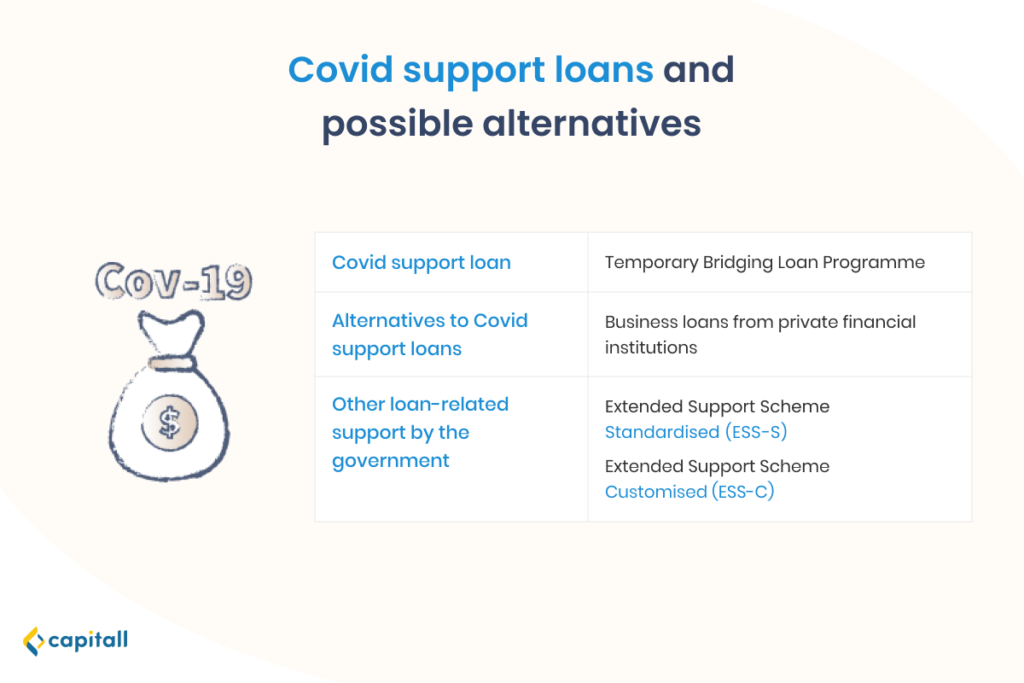

Covid-19 Support Loan: Loan Programmes Every Business Should Know

The COVID-19 pandemic has caused economies worldwide to fall into a recession. With domestic-oriented sectors severely affected, Singapore’s economy is expected to take longer to recover than from past recessions. As of 30 October 2020, more than 20,000 people have been retrenched. In September 2020, our unemployment rate rose to 3.6%. Businesses have been struggling to survive, but they are not alone in this. The government has introduced several Covid-19 support loans to help companies through the economic downturn.
One such loan is the Temporary Bridging Loan Programme (TBLP) by Enterprise Singapore (ESG).
If you are a business owner, understanding what business loans are available and how to tap into them can make a world of difference to your company.
Not only are there government-assisted schemes, but there are also private financial institutions that offer loans to companies. Let’s take a look at some of them in this article.

Temporary Bridging Loan Programme (TBLP)
How it works
The Temporary Bridging Loan is a government-assisted Covid-19 support loan that provides companies from all sectors access to working capital for their business needs.
Managed by Enterprise Singapore, eligible firms can borrow up to S$5 million from participating financial institutions (PFIs) for applications until 31 March 2021, and S$3 million for applications from 1 April 2021 to 30 September 2021.
The maximum repayment period is at 5 years, and the interest rate is capped at 5% p.a.
The government will provide 90% risk-share on these loans for applications initiated from 8 April 2020 until 31 March 2021, and 70% risk-share for applications from 1 April 2021 to 30 September 2021.
You can apply for multiple Temporary Bridging Loans under different banks, but the maximum amount your company can borrow is still capped at S$5 million.
Eligibility
There are 2 criteria for firms to apply for the Temporary Bridging Loan.
Firstly, firms need to be a business entity that is registered and physically present in Singapore. ACRA registered Sole Proprietorship, Partnership, Limited Liability Partnership, and Companies are also eligible for the loan.
Secondly, at least 30% local equity has to be held directly or indirectly by a Singaporean(s) and/or Singapore Permanent Resident(s), determined by the ultimate individual ownership.
However, approval of the loan is still subject to the PFI’s assessment. It is up to the PFI to decide if they are willing to provide your company with a loan.
Loans for SMEs
Besides the Temporary Bridging Loans, there are more schemes catered towards SMEs to ease their financial strain.
As some SMEs face temporary cash flow constraints, they may struggle with making principal repayments on their loans during this period.
The government has reached out to partnering financial institutions to offer options for SMEs who need to lower the short-term repayment obligations for their loans.
Extended Support Scheme – Standardised (ESS-S)
SMEs who need further relief and are unable to pay their loan instalments in full can consider the ESS-S, which defers the payment of principal on SME loans.
Under this scheme, SMEs can defer 80% of principal payments for fully secured term loans and loans granted under ESG’s Enhanced Working Capital Loan Scheme and the Temporary Bridging Loan Programme.
The ESS-S covers ESG’s loan schemes for broader support.
The deferment duration depends on 2 factors: 1) the sector of the SME, and 2) when the business applies for the deferment.
SMEs operating in Tier 1 and 2 sectors may obtain a deferment up to 30 July 2021. In comparison, SMEs in Tier 3A and 3B sectors may get a deferment up to 31 March 2021.
| Tier 1 and Tier 2 | Tier 3A and 3B | |
| Sectors | – Aviation and aerospace – Tourism – Hospitality, conventions and exhibitions – Licensed food shops and food stalls – Qualifying retail outlets – Arts and entertainments – Built environment, land transport, and marine and offshore | All other sectors not in Tier 1 and Tier 2 |
| Deferment period | 1 January 2021 to 30June 2021 | 1 January 2021 to 31March 2021 |
Your company should not be more than 30 days late on all loan payments to be eligible. Your company should also not have overdue interest payments for loans which have already been granted a principal moratorium.
Extended Support Scheme – Customised (ESS-C)
If you find that the ESS-S is unsuitable for your cash flow needs, you can consider the ESS-C — a customised multi-lender restructuring scheme developed by banks and finance companies.
Under this scheme, the lender will facilitate restructuring the borrower’s loans across multiple financial institutions. This ESS-C complements other restructuring assistance schemes under the Ministry of Law’s proposed Simplified Insolvency Programme (SIP) and the Credit Counselling Singapore’s (CCS) scheme for sole proprietors and partnerships.
The ESS-C is available from 2 November 2020 to 30 June 2021 for SMEs with multiple lenders, and for those who are unsuitable for the SIP and SPP Schemes.
Here is a comparison of the government’s restructuring schemes that we have covered.
| Restructuring Schemes | MinLaw’s SIP | CCS’ SPP Scheme | ESS-C |
| Eligibility | Qualifying micro and small companies, with single or multiple creditors and liabilities up to S$2 million | Sole proprietors and partnerships, with multiple creditors and unsecured debt of up to S$1 million. | All SMEs with multiple creditors that do not qualify for SIP or SPP Scheme |
| Nature of assistance | Restructuring or winding up | Restructuring only | Restructuring only |
| Creditors | All creditors | Banks, finance companies, and PFIs under ESG loan schemes | Banks and finance companies |
| Products | All debts | Unsecured business loans only | All credit facilities |
| Legally binding outcome? | Yes | No, the scheme is voluntary | No, the scheme is voluntary |
You may refer to this media release by the Association of Banks in Singapore for more information.
Business Loans From Private Financial Institutions
Besides banks and PFIs, there are several private financial institutions which offer Covid-19 support loans to businesses.
Capitall offers a variety of business loans for different financial needs from working capital loans to payroll loans. Let us dive into the different types of business loans in the market.
1. Business Line Of Credit
A credit line allows businesses to manage unforeseen expenditures and fund growth opportunities. It is like a credit card for businesses to draw funds from a pre-approved sum of money.
Interest is charged only on the amount drawn, and the credit limit goes back up once the amount drawn is repaid.
A credit line will allow you to have quick access to capital for any reason, giving you greater control and flexibility over the use of these funds. It is also a great way to increase your capital to take advantage of emerging business opportunities.
Besides giving your company quick access to funds, this loan is good for covering short-term business expenses and recurring financial expenses.
We cover more about business line of credit here.
2. Working Capital Loan

A working capital loan is a loan for financing everyday operations such as payrolls and rent.
You can take a working capital loan if you require cash and asset liquidity to cover day-to-day operational expenses.
It is suitable for covering short-term business expenses and is commonly used by companies with high seasonality or cyclical sales, such as retailers.
Another benefit of this is that it does not require an equity transaction.
3. Bridging Loan
A bridging loan is a short-term loan that provides your company with immediate cash flow to meet current obligations while expecting fresh funds within a short time frame.
It provides temporary funding for urgent business expenses such as purchasing property and securing a business opportunity.
4. Expansion Financing
Expansion financing is typically used to fund growth projects while still retaining enough capital for daily operations.
It can be used for internal growth such as launching new products, acquiring smaller companies, or taking advantage of opportunities that may lead to compounded growth.
You can use expansion financing to hire more staff, have more financial ability to create new products, or shift to a larger retail space.
5. Auto Financing

Auto financing refers to taking out loans to purchase vehicles. It is typically split into two types:
- Car flooring loan — Car flooring loans allow you to use a revolving credit facility to buy an existing stock of vehicles. This frees up cash flow since you don’t have to tie up large amounts of assets to showroom stock.
It increases working capital, improves cash flow, and increases your stock of vehicles.
Learn more about car flooring loans here.
- In-house loan — With an in-house auto loan, you can buy a car easily regardless of your credit status.
In-house auto loans are quickly approved by private financial institutions like Capitall, enabling you to easily finance a car even if banks have rejected your loan applications.
Read here for more information on in-house auto loans.
6. Payroll Loan
Payroll loans are short-term loans that can cover your staffing fees, enabling you to divert your capital into other ventures like business expansion.
It allows you to have better management of increments in staff salaries. You can also use the loan to subsidise immediate financial needs such as hiring extra employees for an event.
Fast Approval With Capitall
Need business capital fast? Capitall can process and approve your business loan application within 24 hours. It’s quick, easy, and fuss-free. Interested in learning more about how Capitall can help grow your business? Feel free to reach out to our financial experts here.

































































































